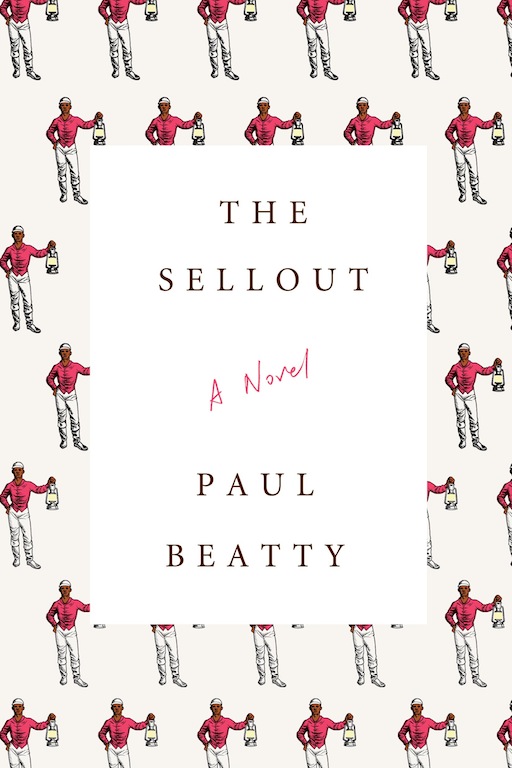
The Sellout
A Novel
کتاب های مرتبط
- اطلاعات
- نقد و بررسی
- دیدگاه کاربران
نقد و بررسی

Starred review from November 24, 2014
Beatty’s satirical latest (after Slumberland) is a droll, biting look at racism in modern America. At the novel’s opening, its narrator, a black farmer whose last name is Me, has been hauled before the Supreme Court for keeping a slave and reinstituting racial segregation in Dickens, an inner-city neighborhood in Los Angeles inexplicably zoned for agrarian use. When Dickens is erased from the map by gentrification, Me hatches a modest proposal to bring it back by segregating the local school. While his logic may be skewed, there is a perverse method in his madness; he is aided by Hominy, a former child star from The Little Rascals, who insists that Me take him as his slave. Beatty gleefully catalogues offensive racial stereotypes but also reaches further, questioning what exactly constitutes black identity in America. Wildly funny but deadly serious, Beatty’s caper is populated by outrageous caricatures, and its damning social critique carries the day.

Starred review from January 1, 2015
The provocative author of The White Boy Shuffle (1996) and Slumberland (2008) is back with his most penetratingly satirical novel yet.Beatty has never been afraid to stir the pot when it comes to racial and socioeconomic issues, and his latest is no different. In fact, this novel is his most incendiary, and readers unprepared for streams of racial slurs (and hilarious vignettes about nearly every black stereotype imaginable) in the service of satire should take a pass. The protagonist lives in Dickens, "a ghetto community" in Los Angeles, and works the land in an area called "The Farms," where he grows vegetables, raises small livestock and smokes a ton of "good weed." After being raised by a controversial sociologist father who subjected him to all manner of psychological and social experiments, the narrator is both intellectually gifted and extremely street-wise. When Dickens is removed from the map of California, he goes on a quest to have it reinstated with the help of Hominy Jenkins, the last surviving Little Rascal, who hangs around the neighborhood regaling everyone with tales of the ridiculously racist skits he used to perform with the rest of the gang. It's clear that Hominy has more than a few screws loose, and he volunteers to serve as the narrator's slave-yes, slave-on his journey. Another part of the narrator's plan involves segregating the local school so that it allows only black, Latino and other nonwhite students. Eventually, he faces criminal charges and appears in front of the Supreme Court in what becomes "the latest in a long line of landmark race-related cases." Readers turned off by excessive use of the N-word or those who are easily offended by stereotypes may find the book tough going, but fans of satire and blatantly honest-and often laugh-out-loud funny-discussions of race and class will be rewarded on each page. Beatty never backs down, and readers are the beneficiaries. Another daring, razor-sharp novel from a writer with talent to burn.
COPYRIGHT(2015) Kirkus Reviews, ALL RIGHTS RESERVED.

October 15, 2014
Dickens, CA, is so embarrassing yet so inconsequential that it has disappeared from the map. One of its residents is Professor Mee, who teaches sociology at Riverside Community College. As a single parent, he homeschools his son while using him in a radical social science experiment with racial implications that might someday result in a profitable book. After Mee is killed in a police shoot-out, the son draws on what he has learned about sociology to launch a crusade that he hopes will put Dickens back on the map. To bring the town some national attention, he resorts to the shocking means of reinstituting slavery and segregation. While he seems to succeed, his actions ultimately bring him before the U.S. Supreme Court, which must consider the ramifications of the case. VERDICT Beatty (The White Boy Shuffle) creates a wicked satire that pokes fun at all that is sacred to life in the United States, from father-son dynamics right up to the Supreme Court. His story is full of the unexpected, resulting in absurd and hilarious drama.--Joanna Burkhardt, Univ. of Rhode Island Libs., Providence
Copyright 2014 Library Journal, LLC Used with permission.

Starred review from December 1, 2014
Beatty, author of the deservedly highly praised The White Boy Shuffle (1996), here outdoes himself and possibly everybody else in a send-up of race, popular culture, and politics in today's America. From the opening pages, in which the narrator is summoned to appear before the U.S. Supreme Court through a mechanism not unlike Publishers Clearing House sweepstakes, Beatty hits on all cylinders in a darkly funny, dead-on-target, elegantly written satire in the tradition of Ishmael Reed and Percival Everett. The narrator, like his social-psychologist father, is a nigger whisperer, skilled in talking down crazed blacks dangling babies from windows or jumping onto train tracks. He is devoted to restoring the negated agrarian city of Dickens in Southern California, where he was born and raised, and then resegregating it. Also the anthologist of the African American humor compendium Hokum, Beatty, though unable to sustain the intense comic pitch throughout, joins the ranks not only of the contributors to that volume but also of the upper echelon of all American humorists. This is frequently laugh-out-loud funny and, in the way of the great ones, profoundly thought provoking. A major contribution.(Reprinted with permission of Booklist, copyright 2014, American Library Association.)

























دیدگاه کاربران